Jeff Alan Ross
telephone interview conducted on January 3, 2009 with Dan Matovina
transcribed by Tom Brennan, edited by Jeff Alan Ross
posted March 3, 2009
introduction | Early History | Badfinger | The '90s and on | Lock My Feelings In A Jar - the new CD
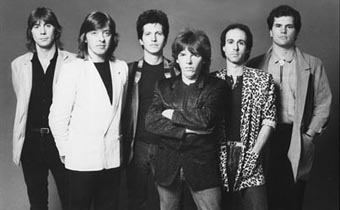
Badfinger as a 6-piece band in 1986
(from l-to-r: Mark Healey, Joey Molland, Randy Anderson, Mike Gibbins, Jeff Alan Ross, Mac Santiago)
YouTube video links: Live in Indianapolis, 1986 with Jeff Alan Ross singing lead
[Without You | Blind Owl (with Gibbins/Santiago dual drum solo) | Baby Blue | No Matter What | Day After Day] Badfinger
DAN: What was your career like in the '80s before playing with Badfinger?
JEFF: Basically, being in L.A., I took a little time off during the very first part of the decade, sort of took a break from music for a little bit. Then I started playing with local bands around Los Angeles. Kept writing and doing all that sort of thing. In '83, when my oldest daughter was born, my wife and I had started looking at the possibility of not wanting to raise a kid in L.A., which turned out to be sort of a silly notion, but that notwithstanding, in '86, we had decided that we were going to move back to Wisconsin. I was going to try to do some writing with some friends out there, and try to join some bands there. While we were making that move was when I got the phone call from Mark Healey about joining Badfinger.
DAN: Now, Mark, obviously, is a friend. When did you first know Mark?
JEFF: I've known Mark since I was 15. I'm 55 now.
DAN: When he called you about Badfinger, you were pretty tight friends I gather? You kept in touch?
JEFF: Yeah. We'd kept in touch. I wouldn't say we were tight friends, but the fact that we'd known each other for so long, you always maintain the friendship. When he called me for that, I just thought it was a great...
DAN: How was the offer presented to you? What did Mark (Healey) say they needed?
JEFF: He said that Joey (Molland) and Mike (Gibbins) were putting together a band; they had most of the band together and they were looking for somebody to play keyboards who could sing some of the songs. I was the first person that Mark thought of. At that point, he had no idea I was actually moving back to the Midwest. Since they were based out of Minnesota, it worked out very well, because I was moving to Wisconsin. So it was just a short ride up to the Twin Cities from there.
It was one of those things where I guess he must have convinced Joey and Mike that I was good, because there was no audition involved or anything like that. I think he just said that this would be a good guy. I don't remember specifically, but I must have talked with Joey on the phone a little bit and just talked over some stuff.
DAN: You only knew that Joey Molland of Badfinger might get you in a group, and that's all you knew?
JEFF: I didn't know any other circumstance. I had no idea what they had been doing during the '80s. I obviously knew that Pete Ham had committed suicide in '75. I knew all about that. When it came to anything else, I really had no idea.
What happened was, they sent me a tape of all the songs they were going to be doing. On my drive from California to Wisconsin, while I was moving, I listened to the tape, all the way back. And that's how I learned all the songs and went and did the rehearsal.
DAN: Was it presented to you that this was a paying gig for a tour or was it just "Come and join us and we'll kinda go from there?"
JEFF: I think they actually had a bunch of gigs already lined up, and it was gonna be sort of a non-stop go out and work & play.
DAN: You were already moving up there and you just kinda looked at it as some sort of a musical opportunity and see where it goes?
JEFF: Well, yeah, and being a fan of the band, I thought it would be really cool, 'cause I figured those guys had... they were around the whole Apple thing and being a Beatles fan that, you know, the experience of being around guys that had actually done something like that... that was pretty interesting.
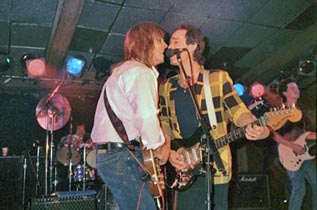
from l-to-r: Mike Gibbins (drums), Joey Molland, Jeff Alan Ross, Randy Anderson
DAN: When you finally traveled to meet Joey and Mike, did you rehearse much for a set and work out what your parts were gonna be, or was this pretty much on the fly?
JEFF: Basically, they had a whole set together of what they wanted the show to be, and they had sent me a tape of all the songs. I learned all the songs, and I remember walking into the rehearsal and playing everything. I remember there were a few things that I actually knew a little bit better than the rest of the band did at that point. I think they were just putting it together themselves. It was a full on show and there were some dates that were already booked, so we were getting ready to play these shows. They had the set of what they wanted to play and I can't remember if they knew that I played guitar too, but I ended up playing guitar. It was pretty obvious I was the only keyboard player, so that was gonna be pretty straightforward. I was going to learn the keyboard parts, which I did. Songs like Baby Blue and things with just guitars, I just played rhythm guitar, and Randy (Anderson) was in the band so I just let those guys do their thing.
DAN: Now, at some point, that touring group had two drummers. Were you in the version that had two drummers at any point?
JEFF: That's how it started out. Yeah.
DAN: What was your perception of what was going on with that?
JEFF: [Laughs] My perception was, I wasn't sure why that was happening. I think somebody may have said to me that maybe Mike hadn't been playing all that much, and so it was to make sure that... to kind of bolster him along, although maybe it might have been that Joey had put the band together with Mark (Healey) and Randy (Anderson) and Mac (Santiago), the drummer, and somehow or another Mike had decided he wanted to be a part of it, so instead of getting rid of the other drummer, they just added, you know, they just added it in and did the two drummers? I know Mike wasn't always completely thrilled about the two drummer thing. They had to work pretty hard at it.
It was a pretty good band. There were nights when it wasn't quite all there, but the nights where everything was what it was supposed to be, it was pretty good. It was certainly full, if nothing else.
DAN: So, you had this 6-piece, at least initially. Did you have a feeling it was like a tour or sporadic dates? How was it run?
JEFF: I remember the first run was actually fairly good, maybe a 2-3 week string of dates across the Midwest. I know we ended up in Florida at one point. So, they were getting work, but I also remember it starting to sort of slim out at one point. I think at that point was when Mike sort of became disenchanted with the two drummer thing, and maybe Mac was getting a little disenchanted too, so I think he (Mac) just left. He was a real good guy, real nice guy and all that. Then we ended up going to the 5-piece with just Mike playing drums, which actually, at that point, he was playing great. He was playing, really, really well. I thought the band sounded just as good as a 5-piece as it did as a 6-piece.
[verified gigs by the 6-piece band: Phoenix, AZ-October 2, 1986; Long Beach, CA-October 10, 1986, Ottawa, KS-December 31, 1986]
DAN: Where was the next block of dates sort of around?
JEFF: I know we went out east to do the Beatlefest [February 28-March 1, 1987]. We played a couple of shows up in Canada, Rochester NY, and towards Buffalo and all that. There was a bunch of those. I think we went to Florida several times.
[verified gigs by the 5-piece band: St. Louis, MO-February 12, 1987; Austin, TX-March 12, 1987; Springfield, VA-March 18, 1987]
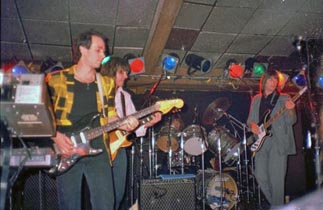
from l-to-r: Jeff Alan Ross, Joey Molland, Mike Gibbins (drums), Mark Healey
DAN: How did you guys travel around?
JEFF: Originally, there was a kind of a motor home that we did, and then I remember, we were playing, played a few nights down in New Orleans. We were going to go from New Orleans up to Washington D.C. and around there, and we ended up... I had a Chevy van that the roadies carried the equipment in, and we bought a Suburban in New Orleans that we used, and we drove the band around in the Suburban for quite awhile.
DAN: Did you have a pause and then do a third bank of dates?
JEFF: I don't remember. It seemed like we'd get a call, and we'd go out and do a few dates, maybe a week somewhere, and then come home. Whatever sort of work could be had. I know there was problems with some of the booking agents.
DAN: Who was setting up the gigs?
JEFF: I don't remember. It wasn't my concern. It was somebody out in Minneapolis for a while, and someone became disenchanted with them. We had some guy maybe out of Detroit, or something like that, who was trying to do some stuff, because Mike was still living in Detroit at the time.
DAN: Musically, on these dates, what were the highlights for you? Was there any particular gig that stands out? What songs got the big reactions?
JEFF: Obviously, the big songs got the big... you know, Day After Day and Baby Blue and No Matter What. At that time, we used to do Come And Get It, but I remember Joey just really disliked doing it [laughs]. Actually, there were some gigs where we never even played it, which I thought was kind of interesting. There's no specific gig that stands out as being like, "Oh, that was unbelievably cool", although I do remember there was a show in Ottawa, Canada. I just remember the theater was really quite nice, and had a real nice stage like an old theater. I remember that being great. The thing about the set that... I always liked playing Baby Blue. We usually did that early on in the show. I got to sing that, and that was always night in and night out, I'd have to say that was maybe my biggest thrill to sing. I really enjoyed it. I still play the song to this day, and I really just love the song. It's just an interesting, great song.
DAN: Who would do the harmony with you on the bridge?
JEFF: I think Mark did, and it could have been a couple of guys. Joey didn't have that high of a voice to be able to do that. It could have been Mark and Randy together or something like that where they would help each other out.
DAN: Tell me about Randy Anderson.
JEFF: Randy is, I think, just a great guitar player, has a great feel. I actually saw him about a year ago in Minneapolis. I went up to a session that he was helping Joey with at a studio up there. I hadn't seen him in probably 20 years. He still plays great. He's one of those guys that just... his feel for what he does with the guitar is just really wonderful, and it sort of lays behind the music and adds to it. I remember him being a great... played slide really well, and just a groovy kind of guitar player. He does what he's supposed to do but he plays great textures. He's real fluid and elegant. I really enjoy listening to him play. He's a great talent.
DAN: Let's talk about the tours, the consistency and attitude.
JEFF: There would be lots of rum & coke at the beginning before we walked onstage, so the consistency was a little off. I learned to deal with it, though. From night to night, Joey would never sing something exactly the same way, but I learned to harmonize with him and sing with him, which has actually come in handy for me so often since that point. The training was great, because that taught me how to sing harmony with almost anybody, because I can follow somebody no matter where they go.
One of the things that was really fantastic about my Badfinger experience is that Joey and I do have this chemistry onstage... There's something that happens and it's never happened to me with anybody else. It's just one of those things that when we did sort of The Beatle thing and sang on the microphone together, there was just something that happened that was kind of a spectacular sort. I even think I'm doing a gig with Joey coming up. It's actually with Peter & Gordon. There's a bunch of people that are on the show that we're backing up and Joey's going to be one of them, this coming May [the 9, 2009 at Jason T. Harper Event Center in McDonough, GA]. I'm sure the same thing will happen. When he and I play together, there's just something that goes on that's different and special. That was the other thing about my Badfinger experience that I really enjoyed, because those moments when that performing electricity thing happened for me, that was great.
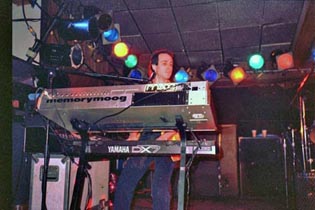
Jeff Alan Ross on keyboards with Badfinger, 1987
DAN: It seemed that you got a lot of showcase in the Badfinger sets. You sang lead on Pete's songs that Joey is singing since that time. Tell me how it felt to sing those songs and lead into why you think you ended up not in this project anymore.
JEFF: As you may or may not know, there's a certain consciousness with a generation, especially of musicians from Liverpool. They're very competitive. John Lennon was that... John & Paul always had that competitive thing. Well, if he had the A-side, I have to have the B-side. There was always that sort of thing, and Joey is very competitive. I think it started, at points, to bother him that people would think I was one of the original guys in the band. I think some people might have thought I was Tommy because, I guess, remotely, I might look a little bit like Tommy, I guess, but, or at least at the time, dark hair and all that sort of thing... Many times people used to think I was one of the original guys, and, of course, I'd have to explain to them that that really wasn't the case [laughs].
DAN: How were you informed that you weren't going to be participating any further?
JEFF: The work started to dwindle a little bit, and there wasn't a lot going on. I was also feeling my time with the band was up. And as it frequently happens, both sides get the same feeling, and I believe this was the case here.
DAN: Were you disappointed?
JEFF: I'm sure, a little bit. It was also that finances were getting a little thin for me anyway. I wasn't making much money from it.
DAN: You weren't paid for the gigs you played?
JEFF: I was paid, but we were not working enough. Also I knew that Mike was leaving, because I spent a lot of time talking with Mike.
DAN: Would you say you got close with Mike?
JEFF: Yeah. We remained friends. We sent Christmas cards every year and we'd talk. Any time I was down in Florida, after he moved to Florida, I'd call him up and we'd try to see each other. I knew that there was one point where he had told me that things were getting out of hand as far as money and he wasn't real happy about that. There was that period of time where he and Joey didn't talk for a long time - to say the least.
DAN: Being your friend, was Mark Healey caught in the middle of your dismissal?
JEFF: No. We stayed friends. I didn't take the whole thing personally. At that point, I wanted to go and play some of my own songs and do some stuff, so it worked out fine. It made sense not to be involved.
DAN: So, was the experience with Badfinger a confidence booster for you, personally?
JEFF: I guess, in a way you could say that would be true. For the most part, I've used it ever since.
DAN: Part of your resumé?
JEFF: Yeah, because it is part of my resumé, and it was something that was fun to do. I always tried, having been a Pete Ham fan, always wanted to make sure that I did whatever I could to make sure that we were being as faithful to the real spirit of what Badfinger really was.
DAN: I felt that you did. Obviously, you didn't have a voice that sounded just like Pete's, but it's about your attitude toward doing it, you had the high quality and the spirit.
JEFF: I have always tried to be respectful of the musical legacy of Badfinger.
DAN: You did actually record with Joey: some demos back in early '87. Explain the whole story behind that. I think you sang a song called, Strike While The Fire Is Hot.
JEFF: The object, at one point, was to try to do a new record. Joey had some songs and I brought that tune in. We cut some of the tracks in Minneapolis and they just sat there. I'm sure somewhere in my house I have a copy of it. I don't think they were ever legitimately finished. They might have been. I don't really remember. That was kind of towards the end.
I think I was done with the band sometime in June or July of '87, probably June of '87, and we did the recordings probably in January or February [some of the demos aired with an interview on WMRY in St. Louis on February 12, 1987].
DAN: You recorded with Mike Gibbins? You did one of his songs, Hurt Me So Bad?
JEFF: Actually, it's kind of a demo that a friend of mine, Don Vallarta and myself did... I do have it somewhere. Mike had sent me a tape of just a bunch of stuff, ideas he had for writing, and I really liked this one song. So we took it and we took the ideas that he had and arranged it like a real song. I quite like the track. It was very Lennonesque, to say the least.
DAN: He gave you some feedback?
JEFF: I don't remember. I just remember we did it, 'cause I liked the song. Of course, it just sat there. At that point, I worked for this TV station in Madison, and they built a studio in the TV station, so I would go in, and I recorded a whole CD; probably 2-3 CDs worth of material.
DAN: What was that album you put out in the late '80s?
JEFF: It was called, "View From A Leaf." It was when I was still using my Elliot Joffrey alias. It came out in '89. It was recorded in '88. I still have CDs available.
DAN: Talk about that album, what you were trying to do there, and what you did to promote it.
JEFF: '89 was when CDs were still in their infancy, for the most part. The internet wasn't what it is now. So, we tried to do just some local marketing things, 'cause we had the TV station; the guy that ran the TV station was... we had played together in bands and he had been my manager and all sorts of stuff at different times. We basically tried to do an infomercial. We did a video for it. "Buy this album," and all that, but nothing... we really didn't get anything. It was a hard way of doing it, 'cause we didn't have regular label distribution, so we sold very few of them, to say the least.
I wanted to do the album because I'd come off the Badfinger experience and I'd been writing songs, and I had all these songs. I actually had songs from even when I had been in The Word, and even older than that; things I had actually never recorded, or things that I had recorded in different forms that I wanted to do a better recording of. It was kind of a wrap-up, conceptually, this is sort of looking back at it all, "Okay, that was all that stuff." It was a cathartic record. Even when I listen to it now, I realize that it is wrapping up what had happened at that point in my adult life, musically, so that I could move on to something else.
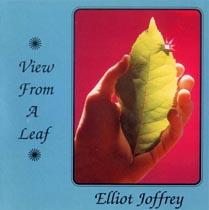
"View From A Leaf" CD by Elliot Joffrey (Jeff Alan Ross) released in 1989
part 3: The '90s and on
© Copyright 2009 Tom Brennan's
Badfinger Library (TBBL). All Rights Reserved.
Reproduction in whole or in part in any form or medium without express written permission
is prohibited.
All trademarks used on TBBL are the property of their respective owners.




